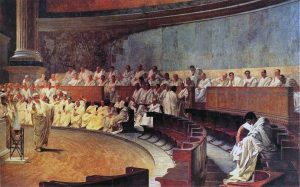This is another entry in a series of posts on the survey course in premodern Hispanic literature:
- “Rethinking the Survey Course” (9/2011)
- “Re-rethinking the survey course: back to the commercial textbook” (7/2013)
- “The survey course: back to the drawing board (again)” (5/2014)
Spanish majors at the University of Oregon are required to take three of four available courses on Hispanic Culture through literature, covering the 12th through 21st centuries. Those of us in the Spanish sector of the department who are specialists in premodernity (Leah Middlebrook, Amanda Powell and me), are responsible for the survey course covering the 12th through 16th centuries, or roughly speaking from the death of Judah Halevi (1141) to the publication of Don Quijote in 1605. We have some 40 contact hours to bring everyone up to speed on the Iberian cultural production of half a milennium (blows smoke off fingertip and puts hand back in imaginary holster).

Spanish Majors of the Past (photo: University of Oregon)
Time was when literary history drew some water. Some thirty years ago, many Spanish majors were pretty much Spanish-speaking/reading/writing English majors for whom literary history was authoritative. ‘The Classics,’ however you might understand the idea, were a prestigious model of literary aesthetics that was emblematic of the learned culture of the times, and therefore worthy of study. For reasons that merit a whole series of blog posts I’m not capable of writing, this is no longer the case. Many students majoring in Spanish are not primarily intersted in literary studies. As a result, a course does not sell on the promise of introducing you to the most important literary works written on the Iberian Peninsula from the twelfth or thirteenth through, say, seventeenth centuries. You will probably do better by appealing to another way in to Hispanic cultural studies, whatever it may be.
This year, I am trying out something new: I am going to try to teach premodern Hispanic literary texts as a series of debates focusing on issues of social importance. Students will learn about Hispanic history and culture by debating issues raised in texts written during the 12th-17th centuries that give voice to the issues of the day: religion, sex, economics, politics. Every week for ten weeks, my students will stage a debate based on their readings of primary and secondary texts, and will publicly argue pro and contra in Spanish.

Critical thinking (Source: CNN)
My thinking was to (a) provide students with some preparation in public speaking and critical thinking with the purpose of developing skills necessary for argumentative writing, and (b) promote critical reading and reasoning skills essential for participatory democracy, so that students will have the intellectual preparation to be full participants in the civic life.
To this end, I’ve prepared a syllabus, and an open-access, online reader free for anyone to use and/or adapt to their needs (there are lots of problems with textbooks, but anyone can tell you that price is one of them). The course is structured as a series of debates. The introduction to polemic and debate centers on an episode in the 14th-century Libro de buen amor (Book of Good Love) narrating a debate between the Greeks and the Romans that the Greeks stage in order to determine if the Romans are worthy of bearing the Greek intellectual legacy. From there. we go on to units about homoerotic Hebrew poetry, crusade theology, the Virgin Mary, Averroism, the Indigenous soul, poverty, European Islam and fiction.

Representation of a sitting of the Roman senate: Cicero attacks Catiline, from a 19th-century fresco in Palazzo Madama, Rome, house of the Italian Senate. (source: Wikipedia)
There are two classes per week. The first day of class will be an introduction to the texts and contexts in which we will learn some background and read the primary and secondary sources texts. In preparation for the second day, students will prepare both sides of a question: is the Cid a Crusader? Is the Virgin Mary a God? Is the creation story literal or metaphoric? Is poverty a choice or a destiny? Students in teams will debate these and other questions, providing evidence from the primary and secondary readings. In so doing, my aim is that the students will gain a familiarity with and insight into the premodern Hispanic world, and develop rhetorical skills in Spanish (that transfer to other languages) that will empower them as participants in public discourse.
I have no idea if this is going to be a successful approach. But I promise to let you know what happens!
